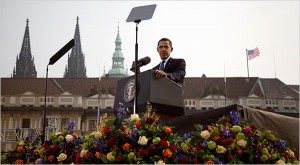
President Obama delivering a speech on nuclear proliferation in Prague, April 2009 – Photo Credit: New York Times
The Center for a New American Security has released a report by Kristin Lord of CNAS and Marc Lynch of George Washington University. “America’s Extended Hand: Assessing the Obama Administration’s Global Engagement Strategy,” is well worth a thorough read. The executive summary includes:
On his blog at FP, March Lynch says the following about the report:
I have just a few thoughts to add:
- Rebalancing the roles of Defense and State is indeed a worthy goal. However, it will require additional funding at State, delivering better support for Foreign Service Officers in the public diplomacy cone and finding ways in which to finally fully integrate public diplomacy into the overall work of the State Department (in ways that has not yet happened since the unwise closing of USIA in the late 1990s). The report details the current challenges at State (including the imbalance of resources) but truly fixing them is another matter. Is there support on Capitol Hill?
- I am not convinced that a small, non-for-profit can address the gaps in U.S. global engagement. Adding yet another such entity in the D.C. landscape might only serve to distract from the role that I note above for State and public diplomacy. It is an idea that has been circulating inside the Beltway for a while and I remain at least mildly skeptical to fix a governmental problem (especially one of capacity and focus) by creating a new entity has a long history in Washington – and the results are mixed, at best.
- I agree wholeheartedly about the role that the NSC must play – that of coordinator, strategy setter and direct staff for the president. The mission creep at NSC has been underway for decades and that temptation is always there for any president. One need only look at the failure of the NSC to play that role during George W. Bush’s first term to understand why coordination is needed. And many examples exist of running operations out of the NSC, some notorious and some just inefficient.
- The authors were certainly prescient in naming both Turkey and Brazil as countries that require extra attention. The recent deal that those two countries struck with Iran on the nuclear issue presented the Obama administration with both opportunities and challenges.
- The authors tackle the definitions of some terms that they rightly note have become “tarnished and loaded” – “public diplomacy,” “public affairs” and “strategic communications.” They propose a master concept captured by “strategic public engagement.” This report is not the first time the phrase has been proposed. The rationale for using it makes sense but as with every new term it remains to be seen if it will be adopted consistently and accurately enough to be useful as a quick reference easily understood by practitioners and scholars alike.
- One important component of what I see as part of strategic public engagement gets very little attention in the report: educational and cultural affairs. It is mentioned in passing and appears on a couple of lists and charts in the report, but it should be seen as a key tool in the engagement toolbox. The Bureau of Educational and Cultural Affairs at State has never fully been integrated and supported after the demise of USIA. The programs it supports and runs constitute an important part of how the US engages students, faculty, professionals and public officials from around the world. Fulbright, Humphrey and Muskie fellowships -as well as the International Visitors Leadership Program – are good examples of ECA’s ongoing work. USAID also works in building university partnerships via the outstanding work of Higher Education for Development and Defense has fellowship programs that send US students overseas like the Boren National Security Education Program. The benefits of these long-term engagement tools, that as exchanges/partnerships embody the essence of engagement, should be better understood and utilized in foreign policy circles.
- The report is filled with insights that are appropriately aimed at taking a deep breath and looking to the medium and long term. I am especially glad to see sentences like “[t]he imperative to listen and engage with foreign publics does not mean that foreign opinion should drive American foreign policy” and “[t]he effects of strategic public engagement will rarely be felt in a single, dramatic outcome.”
- On pages 23-25 there is a nice review of the Obama administration’s approach to democracy and human rights as reflected in its strategic public engagement, much of which is driven by seeking to avoid the mistakes of the previous administration. The authors say:
This certainly tracks with my own experience in implementing democracy and governance projects in the Middle East (and other places) throughout most of this decade. It was clear that there was in inverse relationship between the success of the projects and the U.S. foreign policy rhetoric about “promoting democracy.” This issue also underscores the need to have USAID and development issues included in strategic public engagement. The ongoing dialogue spurred by the QDDR addresses that to some degree, but the cultural (in Washington, that is) and bureaucratic barriers to including development will be difficult to surmount.
Whatever disagreements or different emphases I might have on the above issues, they are minor. This is an excellent report and should be required reading for anyone interested and/or involved in strategic public engagement.